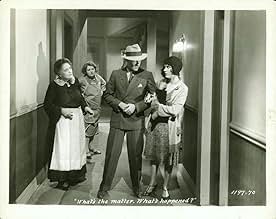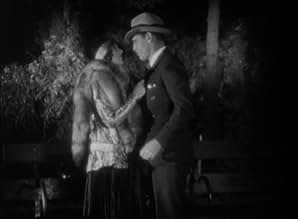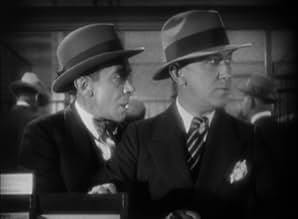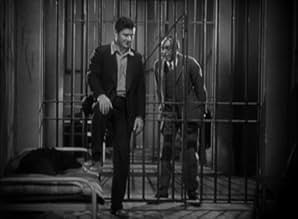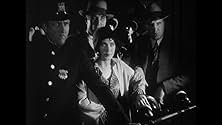Ajouter une intrigue dans votre langueA criminal known as Thunderbolt is imprisoned and facing execution. Into the next cell is placed Bob Moran, an innocent man who has been framed and who is in love with Thunderbolt's girl. Th... Tout lireA criminal known as Thunderbolt is imprisoned and facing execution. Into the next cell is placed Bob Moran, an innocent man who has been framed and who is in love with Thunderbolt's girl. Thunderbolt hopes to stave off the execution long enough to kill young Moran for romancing h... Tout lireA criminal known as Thunderbolt is imprisoned and facing execution. Into the next cell is placed Bob Moran, an innocent man who has been framed and who is in love with Thunderbolt's girl. Thunderbolt hopes to stave off the execution long enough to kill young Moran for romancing his girl.
- Nommé pour 1 oscar
- 2 victoires et 1 nomination au total
- Thug in Bank at Robbery
- (uncredited)
- Prisoner #8
- (uncredited)
- Black Cat Cafe Patron
- (uncredited)
- Chuck - 1st Prisoner #5
- (uncredited)
Avis en vedette
This isn't a gangster film, it's an intelligently written character study and in-depth look into the mind of a mobster. You find writer Jules Furthman's name on virtually every other classic Hollywood picture of the 20s, 30s and 40s. His style was quality and his skill was creating believable engaging stories with real genuine characters. His story was further adapted by H Mankiewicz - who wrote the scripts for the probably the other half of the classics from this period. Needless to say - this is well written with fascinating and deeply faceted characters.
Josef von Sternberg directed this which by the look of it was his fiftieth talkie. Surely it's impossible that this was his first sound film? Being made in 1929, it's still a little experimental, not quite everything works so this is not one of his best pictures. Nevertheless he creates a brooding almost surreal atmosphere with real tension. That style intensifies significantly in the latter part of the film on death row which has an almost dream like feel about it.
The story is tense, the characters are believable, the production is innovative but this is not a perfect film. To enable clear sound recording, some but not all of the actors speak very slowly which sounds especially weird when the actor they're talking with is speaking normally. Actors had their own individual vocal coaches then with different techniques thus the inconsistency and maybe not being a native English speaker, von Sternberg probably didn't notice the subtle differences.
As great a director as he was, von Sternberg was given the impossible task of trying to make Fay Wray seem like a proper actress. Not even he could do that and predictably she's absolutely dreadful. As always she just projects that limp, whining and insipid expression to convey whatever emotion she's trying to express.
Whether she's pretending to be a hard as nails gangster's moll or a reformed, sweet and vulnerable fragile young thing she's that same bland, shallow character. Not only can't she act but in this she doesn't appear to be able to speak English - what on earth is that accent! She's meant to be a girl from the streets so why is she doing history's worst impression of Queen Mary? That two men could be besotted with this dull sour-faced non-entity completely stretches all credibility.
Mankiewicz's famous telegram to Ben Hecht describes how desperate movie studios were to hire good writers. "Millions are to be grabbed out here and your only competition is idiots. Don't let this get around."
Mankiewicz was the highest-paid writer in Tinseltown. Kael described, "His heroes weren't soft-eyed and bucolic; he brought good-humored toughness to the movies, and energy and astringency. And the public responded, because it was eager for modern American subjects." In "Thunderbolt," adapted from a Charles and Jules Furthman story, Mankiewicz's script focuses on Jim Lang (George Bancroft), nicknamed Thunderbolt, wanted by the police. His girlfriend, 'Ritzy' (Fay Wray), is seeing banker Bob Moran (Richard Arlen) behind Jim's back. Lang is captured and is headed for the chair. In jail, he discovers who Ritzy's boyfriend is and frames Bob in a cop's murder. When arrested and sentenced, Bob finds himself in the jail cell next to Thunderbolt.
"Thunderbolt" was the type of movie designed for director Josef von Sternberg for his first talkie. The silent movie director of 1927's "Underworld," which introduced the gangster genre, was excited to be making talkies. He said he was "no longer at the mercy of movie house organists."
Sternberg especially loved to mix music with his actors' dialogue. In a classic nightclub scene, singer actress Theresa Harris, in her film debut, belts out a song while Thunderbolt and Ritzy are in an argument. Between Harris' numbers, the jazz band plays in the background while tension builds between Lang and nearby loud customers. The tense sequence reveals the inner turmoil of Thunderbolt. Film critic Andrew Sarris notes, "'Thunderbolt' is, in some respects, as much a musical as a melodrama." Sternberg was praised overseas for his film, receiving a telegram from German director Ludwig Berger, stating "I saw your film 'Thunderbolt' and congratulate you with all my heart. It is the first fully realized and artistically accomplished sound film. Bravo!" "Thunderbolt" was the second talkie for actor George Bancroft, his first was the now lost 1929 'The Wolf of Wall Street.' The actor earned a Best Actor Academy Award nomination for his role as Thunderbolt.
The future was bright for Mankiewicz, working alongside his younger brother, Joseph, who wrote the titles in "Thunderbolt." Herman is known by today's movie fans as the first screenwriter for 1939's "The Wizard of Oz," and for his collaboration with Orson Welles in 1941's "Citizen Kane."
The first third of the film moves about quite a bit with some great jazz age settings, but the last two-thirds is primarily confined to the death house where Thunderbolt awaits his appointment with the chair. There's lots of atmosphere in this one with the death row quartet that keeps getting broken up as one fellow is executed and then restarted as another inmate enters. The death row warden is an interesting fellow, with eccentricity and nervousness balanced by a humane streak to the point that he seems misplaced - he seems like he'd be happier managing the shoe department in some retail store.
The end has a surprise twist to it that makes Thunderbolt rethink his rather complex plan of revenge just as he makes that last walk to the chair. I'm being intentionally vague here so I don't ruin it for you. Watch it for the surprising sophistication of this early sound piece, for the kind of atmosphere you can always count on in a von Sternberg film, and for that general touch of class that you find in the early Paramount talkies.
Le saviez-vous
- AnecdotesOne of the earliest of over 700 Paramount productions, filmed between 1929 and 1949, which were sold to MCA/Universal in 1958 for television distribution, and have been owned and controlled by MCA ever since. However, because of its extreme age, and primitive sound recording techniques, there is no record of it ever having been locally televised. On cable TV it received what may have been its first and only telecast on Turner Classic Movies in August 2016.
- Autres versionsMade in both sound and silent versions.
Meilleurs choix
- How long is Thunderbolt?Propulsé par Alexa
Détails
- Durée1 heure 25 minutes
- Couleur
Contribuer à cette page


